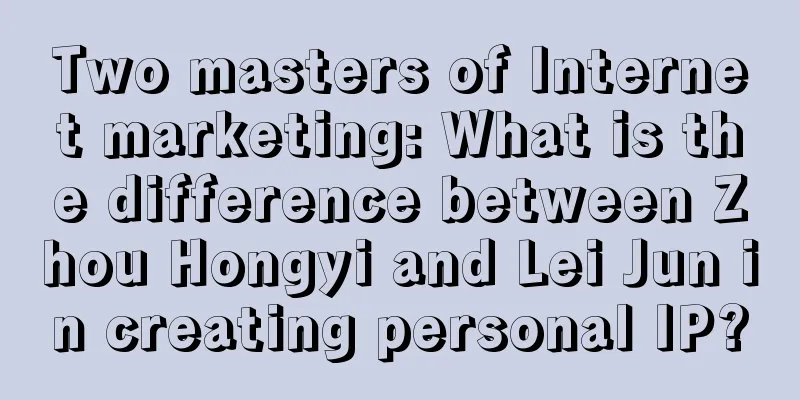Two masters of Internet marketing: What is the difference between Zhou Hongyi and Lei Jun in creating personal IP?

Recently, at a symposium commemorating the 30th anniversary of the Internet, an interesting thing happened: Zhou Hongyi asked Lei Jun for a new car to experience, but Lei Jun declined the request in a humorous way. This episode may be insignificant, but it reveals the two men's very different marketing styles. Lei Jun and Zhou Hongyi are definitely the best marketers among China's Internet giants, and their marketing has recently become a hot topic on the Internet. Lei Jun, as the head of Xiaomi, has become a frequent visitor to the hot search list since the launch of Xiaomi Auto SU7. In particular, in a live broadcast on April 18, Lei Jun attracted millions of online viewers with his unique charm and in-depth product introductions. The live broadcast effect was so good that it attracted the attention of the entire automotive industry, and many bigwigs in the automotive industry also began to imitate Lei Jun's marketing model. At the same time, Zhou Hongyi has also been going further and further on the road to becoming an Internet celebrity this year. He announced that he would sell his Maybach luxury car and choose a domestic new energy vehicle instead. This news quickly attracted huge attention on the Internet. A large number of car companies heard the news and sent their latest models to the 360 headquarters, hoping to become Zhou Hongyi's new car. This event not only made Zhou Hongyi a hot topic on the Internet again, but also greatly enhanced the brand influence of 360. Lei Jun and Zhou Hongyi, as two masters of Internet marketing, what are the differences between their marketing? This article will analyze them. 1. Personal IP: Tough vs. RealWhen it comes to building personal IP, Zhou Hongyi and Lei Jun are both unparalleled masters, but the images and strategies they present are very different. Zhou Hongyi's image is that of a tough and unruly Internet "warrior" who dares to face conflicts head-on. He dares to challenge industry giants and often directly confronts his opponents online. This style earned him the nickname "Red Cannon" in the early days. Whether it is the "3B War" with Baidu, the "3Q War" with Tencent, or the competition in the smartphone market, Zhou Hongyi's actions always arouse widespread discussion among the public and increase brand awareness and attention. A recent case is the dispute between Zhou Hongyi and Cheng Qian. At a conference, Zhou Hongyi bluntly criticized Cheng Qian for not knowing how to give speeches and host. After the incident, Zhou Hongyi launched his own speech course, which once again made him the focus of media and public attention. This marketing strategy of daring to express oneself and being good at leveraging opportunities is exactly Zhou Hongyi's consistent style. Compared with Zhou Hongyi's chariot of fire, Lei Jun is the "big brother next door" in the Internet world, always giving people a friendly and down-to-earth image. Since the popular phrase "Are You OK?" in 2015, Lei Jun has established an image of being approachable and sincere. This image is based on his direct communication and sincere dialogue with users for many years. Through live broadcasts and other channels, he shows an approachable style, which makes consumers believe that every word he says is reliable. In the live broadcast on April 18, Lei Jun continued to maintain his usual style. Although he is known as the "shuangwen hero", he admitted in the live broadcast that he was not the top scorer in the college entrance examination and did not have 4 billion in savings, and he still focused on sincerity and reality. This kind of reality makes consumers feel that his brand is also credible. When he talks about ecology, everyone thinks it is valuable, but when Jia Yueting talks about ecology, everyone thinks it is exaggerated. When he says it is not profitable, everyone thinks it is really not profitable, but when others say it is not profitable, everyone thinks it is a lie. This marketing method based on trust has helped Lei Jun establish a good reputation among consumers. His sincerity and reality make consumers believe that Xiaomi's products are trustworthy and Xiaomi's brand is sincere. This power of trust is the key to Lei Jun's marketing success. 2. Marketing strategy: PR vs. marketingZhou Hongyi's marketing strategies are often preceded by public relations tactics. He is good at creating controversial concepts to stimulate public opinion. The key to this strategy is to first arouse extensive discussion among the media and industry KOLs on the B-side (enterprise side), and then expand the influence to the C-side (consumer side), triggering heated discussions among ordinary users. In this process, Zhou Hongyi cleverly implanted his own brand into the discussion, thereby achieving high exposure for the product. Taking the launch of 360 mobile phone as an example, Zhou Hongyi proposed the innovative concept of "free mobile phone, making money with software". In the book "Zhou Hongyi's Autobiography: My Internet Methodology", Zhou Hongyi believes that Xiaomi mobile phone is a hardware free model. This concept caused a huge debate in the industry at the time. Although the 360 mobile phone did not achieve the expected success in the market, the introduction of this concept undoubtedly brought huge volume and attention to the 360 mobile phone. Zhou Hongyi's marketing method fully reflects his public relations strategy of being good at creating topics. In comparison, Lei Jun's marketing strategy is more direct and pragmatic. The "Three Threes Rule" he proposed - making popular products, gaining fans, and creating self-media - is the core of his marketing strategy. Create hot products: Lei Jun firmly believes that only by creating truly excellent products can we win the recognition of the market and consumers. Therefore, Xiaomi always adheres to user demand-oriented, and continuously launches cost-effective hot products to attract and retain users. Become a fan: Xiaomi attaches great importance to the construction of fan culture. Through channels such as the MIUI forum and social media, Lei Jun actively interacts with users and has established a strong fan base. These fans are not only loyal users of Xiaomi products, but also spontaneous disseminators of the Xiaomi brand. Become a self-media: Lei Jun makes full use of self-media platforms to reduce marketing costs and achieve direct communication with users. Through live broadcasts, Weibo and other channels, Lei Jun personally introduces product features to users and answers user questions. This direct and transparent communication method greatly enhances users' willingness to buy. 3. Marketing methods: individual vs. groupAs Internet tycoons who attach great importance to marketing, Lei Jun and Zhou Hongyi are of course well aware of the importance of teamwork. Therefore, they both have strong public relations and marketing teams behind them. However, judging from their marketing performance, Zhou Hongyi is better at fighting alone, while Lei Jun is better at fighting in a group. Zhou Hongyi is often seen as a lone warrior. His former nickname "Red Cannon" is a vivid description of his direct and sometimes even impulsive marketing methods. His single-soldier combat ability is well-known in the Internet industry. By raising controversial views, sparking public discussion, and even attacking competitors, Zhou Hongyi has successfully established a distinct personal image in the public mind. Although this individualistic marketing approach is sometimes controversial, it can quickly attract public attention and increase brand awareness. In the 3Q war, Zhou Hongyi almost single-handedly shaped 360 into a defender of user rights. This strategy not only effectively enhanced 360's public image, but also won it a loyal user base. Zhou Hongyi's solo marketing approach is more like Xiang Yu, who fought against a hundred enemies alone and was brave and courageous. In contrast, Lei Jun is more like a commander who is good at group operations, and he is more like Liu Bang. Behind Xiaomi's marketing is a well-designed marketing system. Especially in the early days of Xiaomi, Xiaomi's main marketing activities were concentrated on social media. Li Wanqiang mentioned in his book "Sense of Participation" that Xiaomi's investment in social media platforms is extremely huge. The team has grown from hundreds of people at the beginning to a much larger one now. Around 2011, Xiaomi had become a model of Weibo marketing, building a powerful online marketing network through close interaction with fans. Recently, Lei Jun also demonstrated the power of this team in live broadcast marketing. Unlike the single-link live broadcast method of traditional enterprises, Xiaomi's live broadcast is a complete system of interaction and dialogue with users. This method reflects more of the brand strategy under the user's thinking rather than a simple corporate marketing action. Since the announcement of the car-making plan, Xiaomi has allowed users to participate in every link, from the exposure of factory spy photos, to price guessing, to the live broadcast story sharing after the release of SU7, every node has made users full of participation and expectations. This series of actions is the result of careful planning and operation of Xiaomi's marketing team. 4. Marketing Concept: Attractive Marketing VS Participatory MarketingZhou Hongyi and Lei Jun both have their own marketing concepts. In essence, they are both user-centric, but their specific expressions are somewhat different. Zhou Hongyi's marketing concept was summarized by self-media person Yu Jian as "touching marketing", the core of which is to touch the hearts of users. In the book "Zhou Hongyi's Autobiography: My Internet Methodology", Zhou Hongyi emphasized that the key to providing excellent user experience is to find the point that can touch the user's emotions. Zhou Hongyi's proposed marketing for attracting attention includes two key points: first, starting from small things, close to the actual needs and psychological expectations of users; second, adopting the strategy of "small steps and fast running", taking quick actions, and continuously trial and error. These two points constitute the law of "micro-innovation" of the Internet advocated by Zhou Hongyi. For example, the "Power-on Time PK" function of 360 Security Guard and products such as 360 Portable Wi-Fi have touched the hearts of users through small but thoughtful innovations, thus winning market recognition. Lei Jun's marketing concept is more focused on "participation marketing", which was summarized by Li Wanqiang, the former marketing director of Xiaomi. Even after Li Wanqiang left, this marketing system continued and developed. Lei Jun emphasized in "Xiaomi Entrepreneurship Thinking" that the purpose of new media is to communicate with users and establish friendly relationships with them. In his view, new media marketing is not only a means, but also a bridge to establish a deep relationship with users. This strategy is fully reflected in the promotion of Xiaomi SU7. When Xiaomi announced its entry into the automotive industry, they not only unveiled the plans, but also sparked widespread public discussion, with many people even buying shares to participate and wait for appreciation. Before the product was launched, spy photos of the new car were released intentionally or unintentionally, and through waves of discussion, the brand's popularity and voice were maintained. At the Xiaomi car technology launch conference, when all eyes were focused on the price that was about to be announced, Lei Jun said, "Stay tuned for the next episode," which sparked widespread speculation and discussion among netizens. After the product was delivered, Xiaomi Auto continued to maintain close interaction with users. For example, when a netizen suggested that the electric rear wing should have a physical button, Xiaomi not only listened carefully to the suggestion, but also responded and made improvements quickly. Through these initiatives, Xiaomi not only makes consumers feel part of the product and brand building process, but also deepens users' brand loyalty through continuous interaction. V. ConclusionAfter interpreting the marketing strategies of Zhou Hongyi and Lei Jun, we will find that although their marketing methods have their own merits, if we analyze deeply into their core, we will understand that whether it is Zhou Hongyi’s "heart-moving marketing" or Lei Jun’s "participatory marketing", the marketing essence they pursue is actually the same. First of all, Zhou Hongyi and Lei Jun's marketing philosophy is firmly user-centric. They know that no matter how the marketing methods change, the ultimate goal is to meet the needs of users and win their trust and support. Therefore, whether it is to impress users through micro-innovation or to make users become part of the brand through participation, they always put users first. Secondly, they are both good at building and operating personal IP. In the Internet age, the influence of personal brands cannot be underestimated. Zhou Hongyi's "red cannon" image and Lei Jun's "real entrepreneur" image have become important assets of their respective companies. They have enhanced the attractiveness and influence of their brands through their personal charm. Thirdly, they are good at using social media to leverage marketing. Whether it is Zhou Hongyi's outspokenness or Lei Jun's sincere interaction, they have established direct communication channels with users through social media platforms. They know how to use social hot spots to create topics and trigger discussions, thereby increasing brand awareness and attention. From the marketing practices of Zhou Hongyi and Lei Jun, we can see the essential marketing techniques: always focus on users, continuously build and strengthen personal brands, make good use of social media, and take advantage of trends. Author: Xunkong Source: WeChat public account "Xunkong's Marketing Revelation (ID: xunkong2005)" |
>>: Tik Tok influencers switch to video accounts, who becomes the “number one player”?
Recommend
The copywriting of BOSS Zhipin has a Dong Yuhui flavor
This article mainly analyzes the advertising copyw...
One case study to understand the entire process of data analysis
Through data analysis, people can identify trends,...
How to operate Amazon's no-source model? Operation tutorial introduction
Many merchants on Amazon started with the distribu...
The secret of Meituan Waimai's successful World Cup marketing: 1 foundation, 3 highlights, and 1 necessary guarantee
The World Cup, held every four years, has come up ...
“The next DeepSeek”? Manus hasn’t woken up Silicon Valley yet
The emergence of Manus has caused a stir in the do...
What to do if Amazon traffic is only in the tens? How to improve it?
After opening a store on Amazon, everyone will als...
Problems with new consumer brands
In the ever-changing consumer goods market, more a...
What should I do if Amazon does not ship my order? Several reasons for not shipping my order
Some friends thought about it for a long time and ...
Is Amazon operation suitable for long-term operation? How to operate it?
Amazon customer service operations and other posit...
How to unblock a Shopee store? What are the rules of Shopee?
If there are any violations in a Shopee store, the...
I haven’t posted on WeChat Moments for a long time. Can I still monetize it?
This article explores the changes in people's ...
JD.com leverages 100,000 sales force to follow Meituan’s lead
In 2025, the high-profile launch of JD.com's f...
Among all the big IPs with a lot of advertisements, is "Joy of Life 2" the only one that is controversial?
The recently popular "Joy of Life 2" has...
Building a marketing activity system (Part 1): Prize system
The introduction to the marketing activity system ...
Black Myth: Wukong surpassed 1 billion on the first day, making all Chinese players excited
The emergence of Black Myth: Wukong has not only e...









